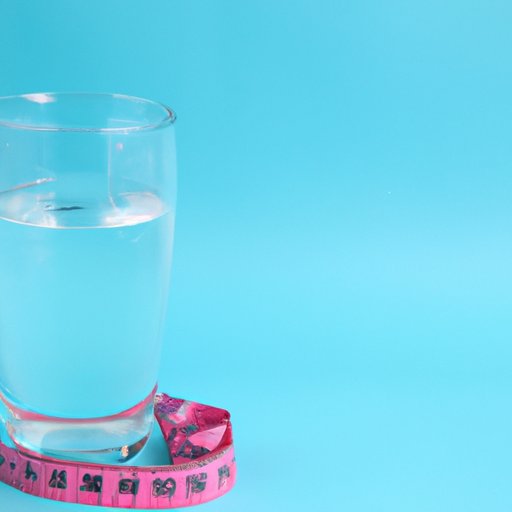
Introduction
For many people, drinking water on a daily basis may seem like a no-brainer – a basic necessity. However, the question of how much water one should drink based on their weight is often overlooked, leaving many unaware of the actual amount of water they need to stay properly hydrated. Adequate hydration is crucial for overall health, and in this article, we will provide a comprehensive guide to help determine how much water you should drink based on your weight, with expert advice and tips to support one’s overall health and wellness.
A Comprehensive Guide to Calculating Your Water Intake Needs
Body weight has a significant impact on the amount of water an individual should drink. A formula commonly used to calculate daily water intake is to divide one’s body weight in pounds by two. For example, an individual weighing 150 pounds should aim to drink at least 75 ounces of water daily. This formula serves as a baseline amount, and factors like activity level and climate should also be considered when adjusting water intake needs.
The body’s need for water increases with physical activity. As such, those who exercise regularly should increase their water intake to compensate for the water lost through sweat. In hotter climates or during heat waves, water intake should also be increased to stay adequately hydrated.
Importance of Drinking Enough Water for Overall Health
Water plays a critical role in the body’s bodily functions, including maintaining body temperature, transporting nutrients and oxygen throughout the body, and eliminating waste through sweating and urination. Proper hydration also aids in digestion, cognition and sleep, and can even aid in weight loss.
Drinking water can assist in reducing appetite and boosting metabolism, both of which can contribute to weight loss. A study by the American Chemical Society found that drinking two cups of water before meals can lead to an average loss of 4.5 pounds over a 12-week period.
On the other hand, dehydration can lead to various health risks, including headaches, fatigue, kidney damage, and even death in severe cases. Chronic dehydration has also been linked to an increased risk of developing certain chronic conditions such as kidney stones, constipation, and urinary tract infections.
Expert Advice to Avoid Dehydration
Staying hydrated throughout the day is crucial to avoid dehydration. A useful tip is to carry a water bottle with you wherever you go, and set reminders to drink water regularly. Common signs of dehydration include dark-colored urine, fatigue, headaches, and dizziness. If you experience any of these symptoms, it is crucial to drink water immediately to rehydrate.
To identify triggers that contribute to dehydration, it is helpful to keep a water intake journal, noting the amount of water consumed, general feelings of thirst, and activities undertaken that may have contributed to fluid loss. This information can then be used to create a personalized approach to water intake that works best for an individual’s needs.
Tips and Tricks for Increasing Water Intake
Increasing water intake can seem tedious, but there are several practical and creative ways to incorporate more water into one’s daily routine. For example, drinking water-infused with fruit or herbs can add flavor and refreshment to your water. Additionally, swapping sugary or caffeinated beverages for water can also contribute to a healthier lifestyle.
Drinking water can also support achieving weight loss and fitness goals, as drinking water before or during meals can help one feel fuller faster, leading to better portion control during meals. Establishing regular water drinking habits can also improve energy levels, assist in muscle development, and enhance overall athletic performance.
Common Myths and Misconceptions About Drinking Water
Many common misconceptions surrounding water intake can hinder efforts to stay hydrated. For example, some believe that vegetable and fruit intake can serve as sufficient hydration sources, but experts agree that nothing can replace the benefits of drinking enough water daily.
Another common myth is that the amount of water one should drink is the same for everyone. However, with various factors such as body weight, activity level, and climate impacting water needs, a personalized approach to water intake is crucial.
Conclusion
Proper hydration is essential for overall health and wellness, and it is crucial to drink enough water daily to support bodily functions and avoid dehydration. By following expert advice for determining water intake needs, staying hydrated throughout the day, and incorporating tips and tricks for increasing water intake, one can benefit from enhanced energy levels, mental clarity, and increased fitness and vitality.





